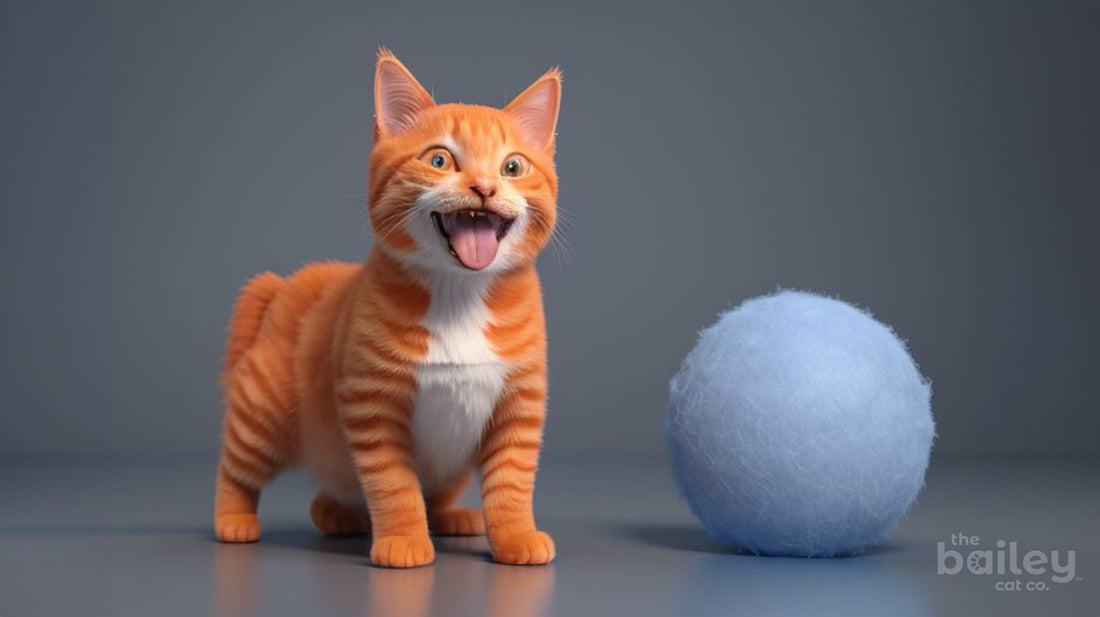

You’re sitting down on the couch watching an old episode of The Office, Oscar and Kevin are secretly watching Angela on the webcam as she licks her cat. Suddenly she feels a tickle her throat and….just at that moment you hear a noise from the living room sounding like it’s somewhere near...your favorite fur rug.
The noise is unmistakable, it's your cat wrenching up a big one. Flying off the couch without touching the floor you arrive there only to find ole’ whiskers has left you a nice surprise to clean up.

Besides being awful, did you know that hairballs can also be dangerous for cats if they become impacted in the digestive system? Hairballs prevent normal digestion and often not all the hair comes up when they puke.
When a cat grooms itself, it’s ingesting hair that accumulates in the stomach and forms a hairball. If the hairball becomes too large, it can cause digestive blockage which at that point leads to vomiting, loss of appetite, abdominal pain, constipation, and in severe cases, surgery may be required!
Regular grooming actually can help prevent hairballs and can make it far less common to deal with in your household. There are also commercial hairball remedies available that help your cats digest the fur so they don’t need to cough up anything anymore.
If you are concerned about your cat's health and they are coughing up hairballs more than twice a year it is best to consult a veterinarian and start a routine of daily brushing.
Hairballs are medically known as trichobezoars, not a dinosaur, but they are a common occurrence in cats that don’t get daily brushing. Cats, when they are happy, will groom themselves frequently, but it’s up to you to get all the loose and dead fur out before they do to prevent them from swallowing too much.
While hairballs are generally not considered extremely dangerous, if they are swallowing too much hair it can occasionally lead to health issues.
Cats groom themselves by licking their fur, and during this process, they inevitably ingest left over loose hairs. These hairs usually pass through the digestive system and are expelled in the feces without causing any issues.
When a cat ingests more hair than the digestive system can handle, the hair may accumulate in the stomach and form a hairball.
This happens because cats' tongues have tiny hook-like structures that make it challenging for them to get rid of loose fur while grooming. See where we’re going with this? This is why it’s crucial to have a good quality brush that gets the fur out!
Occasional hairballs are considered normal, and most cats will vomit them up or pass them in their feces. However, if a cat is consistently producing large or frequent hairballs, it may be a sign of an underlying issue such as excessive grooming, skin problems, or digestive disorders.
In some cases, hairballs can cause complications. A hairball that is too large to pass through the digestive tract may cause a blockage, leading to symptoms such as vomiting, lethargy, loss of appetite, and constipation. Severe blockages may require veterinary attention.
To help prevent hairballs, regular grooming by you on your cat can be beneficial, especially for long-haired breeds. Brushing the cat's fur helps remove loose hairs, reducing the amount ingested during grooming. Additionally, specialized cat foods and treats designed to control hairballs should be considered, no one likes a stomach full of fur!
If a cat exhibits persistent signs of distress, repeated vomiting, or difficulty passing stools, it is crucial to seek veterinary advice. A veterinarian can conduct examinations, including imaging tests, to determine the presence of any blockages or underlying health issues.
While hairballs are common it's essential for pet owners to monitor their cats' grooming habits and behavior. Most often with our cats and the cat parents we hear from, hairballs are practically a thing of the past when you brush daily. If a cat is consistently struggling with hairballs or exhibits concerning symptoms please take your kitty to an expert!
No comments
0 comments